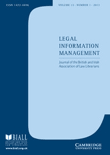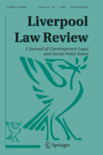
LAW LIBRARY JOURNAL
Scope & Guideline
Transforming legal scholarship through library expertise.
Introduction
Aims and Scopes
- Legal Research and Education:
The journal emphasizes methodologies and innovations in legal research, including advanced teaching techniques and the integration of technology in legal education. - Access to Justice and Equity:
A core focus is on improving access to legal resources and services, especially for marginalized communities, advocating for equity in legal research and library services. - Impact of Technology on Law:
The journal explores the implications of emerging technologies on legal practices and library services, including the use of artificial intelligence and digital resources. - Collection Development and Management:
It addresses the challenges and strategies in collection development within law libraries, highlighting best practices for curating legal information and resources. - Social Justice and Legal Reform:
The journal frequently publishes on social justice issues, examining the legal system's role in societal challenges such as mass incarceration, immigration law, and civil rights. - Diversity, Equity, and Inclusion in Law:
A prominent theme is the promotion of diversity and inclusion within legal education and library services, reflecting societal changes and the need for representation.
Trending and Emerging
- Integration of Technology in Legal Practice:
There is a notable increase in discussions around the integration of technology in legal practice, including AI and digital resources, highlighting the need for law libraries to adapt to these innovations. - Social Justice and Reform Advocacy:
A growing number of articles address social justice issues, particularly focusing on mass incarceration, immigration reform, and civil rights, reflecting a heightened awareness of these topics in the legal community. - Focus on Mental Health and Well-being in Legal Professions:
Emerging themes include the mental health challenges faced by legal professionals and law students, indicating a shift towards addressing well-being within the legal profession. - Climate Change and Environmental Law:
Recent publications are increasingly incorporating themes related to climate change and environmental law, emphasizing the legal system's role in addressing environmental crises. - Diversity, Equity, and Inclusion Initiatives:
There is a rising trend in articles focused on diversity, equity, and inclusion within legal education and library services, demonstrating a commitment to fostering a more inclusive legal community.
Declining or Waning
- Traditional Legal Scholarship:
There seems to be a waning interest in purely theoretical or traditional legal scholarship, with more emphasis now placed on practical applications and interdisciplinary approaches. - Historical Legal Analyses:
Although historical perspectives are still of interest, the frequency of papers focused solely on historical legal analyses has decreased, suggesting a shift towards contemporary issues and solutions. - General Library Science Topics:
General discussions about library science, without a direct legal context, are becoming less common, as the journal increasingly prioritizes topics that directly relate to law and its practice. - Conventional Legal Literature Reviews:
The typical literature review format appears to be less favored, with a movement towards more innovative and applied research methodologies that address current challenges and technologies.
Similar Journals

Veredas do Direito
Fostering insights that shape legal practice.Veredas do Direito is a prominent academic journal dedicated to the dynamic field of law, published by the esteemed Escola Superior Dom Helder Camara in Brazil. With its ISSN 1806-3845 and E-ISSN 2179-8699, this journal has established itself as an open-access platform since 2004, fostering a culture of knowledge dissemination and accessibility. It occupies a significant niche within the legal discourse, as reflected in its 2023 Scopus rankings, placing it in the 3rd quartile for Law and the 4th quartile for Management, Monitoring, Policy, and Law. The journal's scope is comprehensive, covering a wide array of legal issues relevant in contemporary society, and it significantly contributes to academics and practitioners by offering insights into effective management and legal policy. Scholars are encouraged to engage with this publication not only for its rigorous research but also for its commitment to advancing legal scholarship in Brazil and beyond, making it an indispensable resource for those committed to excellence in legal studies.

Legal Information Management
Empowering Legal Minds Through Information Mastery.Legal Information Management is a prestigious journal published by Cambridge University Press that serves as an essential resource for professionals, researchers, and students engaged in the dynamic field of legal studies. With a focus on the intersection of law and information management, this journal provides a platform for exploring contemporary issues, best practices, and innovative solutions related to the management of legal information and resources. Although it does not currently offer Open Access options, its rigorous peer-review process ensures the publication of high-quality research that significantly impacts legal education and practice. With its strong academic reputation and commitment to advancing knowledge in legal information management, this journal is crucial for anyone looking to stay updated on critical developments in the field. Located in Cambridge, England, this journal continues to strive towards enhancing the accessibility and understanding of legal information structures globally.

Anuario de Filosofia del Derecho
Cultivating Knowledge in Legal PhilosophyAnuario de Filosofia del Derecho is a prestigious journal dedicated to the exploration and advancement of legal philosophy, published by the Ministerio Justicia, Centro Publicaciones in Madrid, Spain. With its ISSN 0518-0872, this journal serves as a critical platform for scholars, practitioners, and students interested in the intricate relationship between law and philosophy. The journal prioritizes original research articles, review papers, and thought-provoking essays that delve into contemporary issues and foundational theories within legal frameworks. Although currently not an open-access publication, it plays a vital role in stimulating discourse in legal and philosophical studies, guiding readers through complex theoretical landscapes while fostering a deeper understanding of justice and legal systems. By contributing to the discourse on legal thought, Anuario de Filosofia del Derecho stands out as an essential resource for anyone seeking to advance their knowledge in this field.

Mexican Law Review
Illuminating Contemporary Legal ChallengesMexican Law Review is a pivotal academic journal published by UNIV NAC AUTONOMA MEXICO, INST INVESTIGACIONES JURIDICAS, dedicated to exploring contemporary issues in the field of law within the Mexican legal system and beyond. Launched in 2019 and set to converge through 2024, this journal serves as an essential platform for legal scholars, practitioners, and students to share innovative research and insights. With an ISSN of 1870-0578, the review critically addresses various legal topics, fostering academic dialogue and contributing to the advancement of legal knowledge and practice. Although classified in the Q4 category in Law with a Scopus rank of #835/1025 and a percentile of 18, the journal is positioned to elevate discussions around Mexican jurisprudence, international law, and comparative studies, making it a valuable resource for those engaged in legal research and academia.

OSGOODE HALL LAW JOURNAL
Innovating Legal Thought for a Changing WorldOsgoode Hall Law Journal, published by the renowned York University Osgoode Hall Law School, serves as a vital platform for legal scholarship in Canada. With a commitment to advancing knowledge in various fields of law, this journal publishes a broad range of articles, case studies, and critical analyses that address contemporary legal issues. While specific impact factors and indexing metrics such as H-Index and Scopus Ranks are not available, the journal's long-standing reputation and contributions to legal education make it an essential resource for researchers, legal practitioners, and students alike. Although it does not offer Open Access options, readers can access its content through libraries and subscriptions, ensuring the dissemination of high-quality legal research. The journal's aim is to foster robust dialogue among legal scholars and practitioners, thereby shaping the future of legal discourse in Canada and beyond.

Annual Review of Law and Social Science
Connecting Legal Scholarship with Social Science PerspectivesThe Annual Review of Law and Social Science, published by ANNUAL REVIEWS, is an essential interdisciplinary journal that bridges the domains of law, sociology, and political science. Established in 2006, this pivotal resource has consistently been recognized for its scholarly excellence, achieving a Q1 ranking in both the Law and Sociology and Political Science categories as of 2023. With a remarkable Scopus ranking that places it in the 93rd percentile among law journals, it serves as a vital platform for researchers and professionals seeking to engage with comprehensive reviews of contemporary issues at the intersection of these fields. Although not an open-access journal, its contributions are fundamental for advancing scholarship and fostering deeper insights into the relationship between social dynamics and legal frameworks. The journal's rigorous annual reviews provide valuable syntheses of the latest research, making it an indispensable resource for academics, policymakers, and students alike.

Revista Juridica Portucalense
Bridging Law, Politics, and Society through ResearchRevista Juridica Portucalense, published by the Universidade Portucalense Infante D Henrique Cooperativa de Ensino Superior in Portugal, stands as an influential peer-reviewed journal focusing on the fields of Law, Political Science, and Sociology. With an ISSN of 2183-5799 and an E-ISSN of 2183-5705, this Open Access journal has made significant strides in promoting scholarly research and academic discourse since its launch in 2014. The journal is categorized in the Q3 quartile for 2023 across its respective disciplines, highlighting its growing impact within the academic community, despite its current H-index rating still being unestablished. With a Scopus ranking pointing to its dedication to quality scholarship—ranked #724/1025 in Law and maintaining a presence in Political Science and Sociology—Revista Juridica Portucalense is an indispensable resource for researchers, practitioners, and students alike who are eager to engage with contemporary legal issues and the interplay of political and social dynamics.

UNIVERSITY OF PITTSBURGH LAW REVIEW
Fostering Critical Discourse in Law and Policy.University of Pittsburgh Law Review is a prestigious academic journal that stands as a cornerstone in the field of legal scholarship. Published by the University of Pittsburgh, University Library System, this journal has been contributing to the discourse of the law since its inception, exemplifying a commitment to advancing scholarly work in various legal domains. Although its open access options are limited, the robust collection of articles and commentaries—spanning from 1973 to the present—provides an invaluable resource for researchers, professionals, and students alike. The journal currently ranks in the Q4 quartile within the field of law for 2023, indicating a specialized focus and offering significant opportunities for legal analysis and research. Positioned in a competitive landscape as Rank #784 out of 1025 in Scopus for Social Sciences - Law, it is an essential platform for emerging voices and innovative ideas that shape legal thought and policy. The University of Pittsburgh Law Review continues to foster critical examination and discussion, making it a vital resource for anyone engaged in the study or practice of law.

COLUMBIA JOURNAL OF LAW AND SOCIAL PROBLEMS
Unpacking Legal Frameworks for Social ChangeCOLUMBIA JOURNAL OF LAW AND SOCIAL PROBLEMS is a distinguished academic journal published by the COLUMBIA JOURNAL TRANSNATIONAL LAW ASSOCIATION, dedicated to the intersection of law and social issues. Established in 1973, this journal serves as a platform for the exploration and analysis of socio-legal problems in the contemporary context. With its robust scope encompassing areas such as social justice, legal reform, and public policy, the journal appeals to researchers, professionals, and students alike who are engaged in critical examinations of the legal systems and their societal impacts. Although it is not an open-access journal, it maintains academic rigor as reflected in its Q4 ranking across various categories including Law and Sociology, indicating its commitment to disseminating scholarly work that contributes to ongoing discussions in these fields. The journal’s address at Columbia University School of Law in New York situates it within one of the leading centers for legal scholarship, making it an essential resource for those seeking to deepen their understanding of law's role in addressing social problems.

Liverpool Law Review
Fostering Dialogue in the Evolving Landscape of LawLiverpool Law Review, published by Springer, is a prestigious open-access journal in the field of law, dedicated to fostering scholarship and promoting dialogue on contemporary legal issues. Since its inception, the journal has evolved significantly, with a publishing history dating back to 1979 and showcasing an extensive range of articles and reviews that contribute to the development of legal theory and practice. The journal is indexed under Scopus, ranking #352 out of 1025 in the Social Sciences category, placing it in the 65th percentile—indicative of its solid reputation and relevance in the field. Liverpool Law Review provides an engaging platform for researchers, professionals, and students alike by facilitating access to high-quality legal research, with full open access available since 2012, ensuring that vital academic discussions are accessible to a global audience. With its commitment to exploring both historical and contemporary issues in law, this journal remains an essential resource for those seeking to deepen their understanding and contribute meaningfully to the legal landscape.